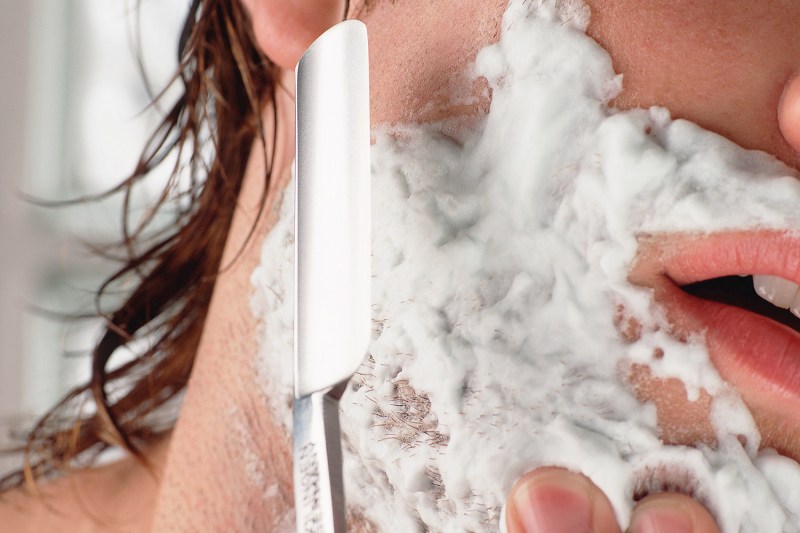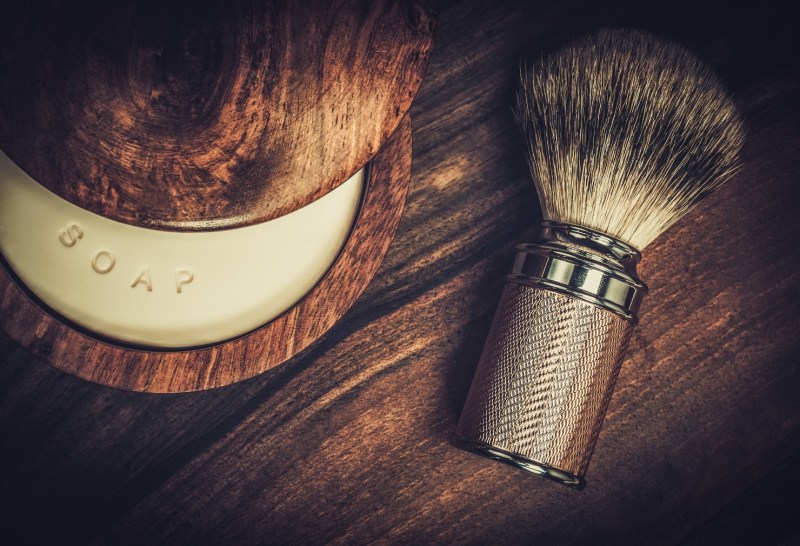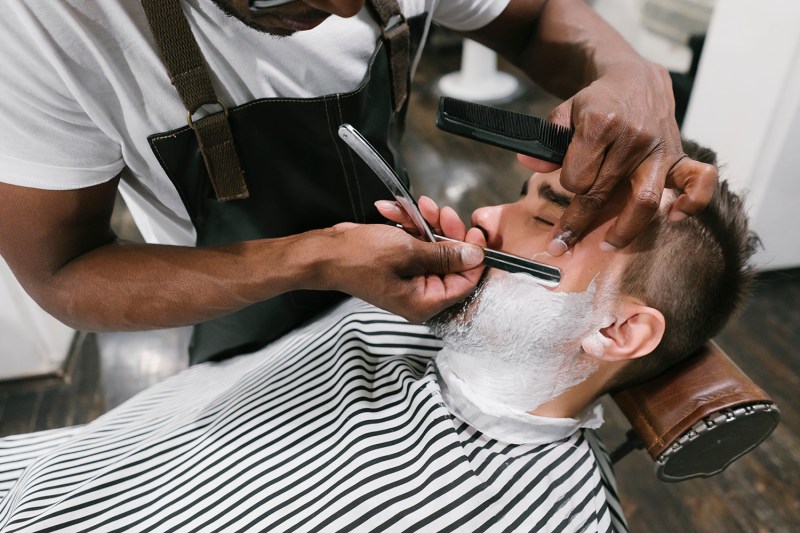
Learning how to shave with a straight razor is a delicate art form of its own that requires practice and patience in learning how to master it. It’s a ritual that can become a meditative discipline for those who hone its craft, almost transporting you back in time — a suave experience. But don’t just take our advice on it. Look no further than the epitome of sophistication — 007 himself.
When Moneypenny helps James Bond finish shaving with a straight razor in the 2012 classic Skyfall, she says — knowingly — that “Sometimes, the old ways are the best.” It’s an adage to live by and one that holds true when it comes to men’s grooming routines.
If you have the time and resources to invest in a super close shave, why not switch from a regular razor to a straight razor? There’s something about an open razor, mixed with a dash of nostalgia, that adds to the allure of what is possibly the closest shave you’ll ever achieve. No doubt that’s why many professional barbers wield the straight razor as their weapon of choice.
“We don’t often recommend men shave with a straight razor as the learning curve is steep and the possibilities for user error (nicks and cuts and even worse) are much greater than with using a cartridge or even a double-edge safety razor,” said Michael Gilman, founder of the Grooming Lounge. However, the advantages of a straight razor shave, Gilman noted, are many. Here’s our comprehensive guide to straight razor shaving:
Prepping your face
You can’t just grab a straight razor and start slicing hairs off. That’s a recipe for disaster. Instead, follow this simple routine to get your face ready for the straight razor:
- Much like any shaving procedure, you have to start with the basics. Start with a clean, washed face. You even can prep after washing by applying a hot towel (just microwave a wet one for 30 seconds) and resting a few minutes while the heat and steam do their work of softening facial hair and follicles.
- Follow that with a pre-shave oil to lube up your whiskers and skin.
- Apply shaving cream in whatever manner you see fit, though we suggest using a badger hair brush to really work it in and lift the hair away from the skin to allow for a closer shave once you touch razor to skin.
- Use the directions in the above section to load a new razor blade into your shavette.
Primed and ready, let’s finally begin shaving.

How to shave with a straight razor
After you’ve followed all the steps above, you’re finally ready to put that blade to your face. Follow these steps, and you’ll wind up with the closest shave you’ve ever experienced at home.
- Place the straight razor in your hand with this basic grip: index, middle, and ring finger on the top of the blade with the thumb in the center at the back and your pinky resting on the blade’s handle/tang. More important than whatever grip you choose, however, is dexterity and comfort. If this method doesn’t feel comfortable to you and leaves you feeling shaky, feel free to switch it up.
- Begin shaving by starting with the right side of your face where your sideburns meet your hairline. Hold the razor at an angle almost parallel to your skin, and with your opposite hand, pull the skin away from the blade and keep it taut.
- Shave downward with the grain using small, smooth strokes. Rinse away excess hair after every stroke.
- Continue in that manner for your right cheek, and then proceed down and over your jawline to your neck.
- Be extra careful when shaving your neck — the skin in that area is extremely thin and most prone to nicks and cuts.
- Repeat the above steps with the left side of your face.
- Once both sides of your face are finished, proceed to your upper lip and, using your opposite hand to pull the skin downward and as taut as possible, shave downward from the nose with small, quick strokes.
- Next is the chin, so this time, pull your lower lip up as far as possible and again shave downward from the lip to your chin and down your neck.
- Give yourself a rinse and a wipe down, and follow up with aftershave and one of the best face moisturizers, and you’re all set for the day.
What is a shavette and how do you load one?
While some straight razors are a true blade, just like your favorite kitchen knife, others feature an easily changeable razor blade — used in a “shavette” — for minimal maintenance.
Murdock London offers the following step-by-step directions for loading a disposable blade:
- Lift the metal catch at the end of the razor and separate the two metal sections.
- Set the fresh blade with the edges facing to and away from you. Hold it from underneath with both thumbs and middle fingers in the middle.
- Bend the edges upwards until they snap clean in half.
- Fit a half-blade over the two raised bumps on the lower metal section and then place the higher metal section on top and squeeze together.
- Close the catch over the two metal sections. Your straight razor is now ready for use.
Why you should use a straight razor
While using a straight razor is difficult, it can still be a task and skill worth learning. Here are just a few reasons why you should strongly consider the straight-razored shave:
Precision
Straight razors offer more precise, controlled shaves compared to traditional safety razors. Triple-bladed safety razors and electric razors both have a ton of contact points with the face. As a result, the final product is hard to control. The single cutting edge of the straight razor gives you the opportunity to focus and define your shave from a single line.
Facial health
While an aftershave balm is a excellent way to reduce irritation from any shave — including one from a straight razor — a proper shave with a straight razor could also reduce your risk of getting ingrown hairs, nicks, and a nasty infection.
Saving money and environment
You will spend less money on supplies for your straight razor since you’re not buying expensive cartridges again and again. Instead, the main skill for straight razor maintenance is learning how to sharpen the blade. Similarly, straight razors are more environmentally friendly — fewer disposable items mean less pollution and resource consumption.

How hard is it to shave with a straight razor?
When learning new grooming routines or habits, it will take time, practice, and trial and error to fully amass enough experience to feel comfortable in doing so. This is imperatively true with learning how to shave with a straight razor. Take your time, and your neck will thank you later.


